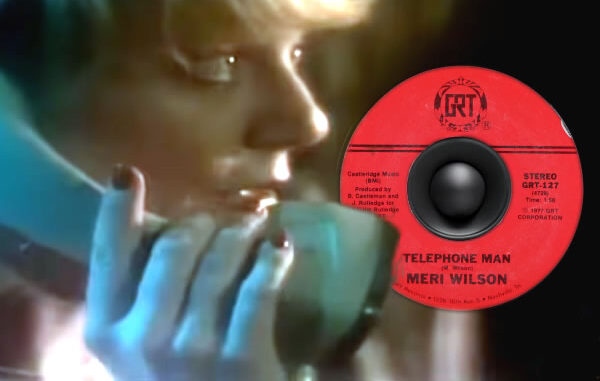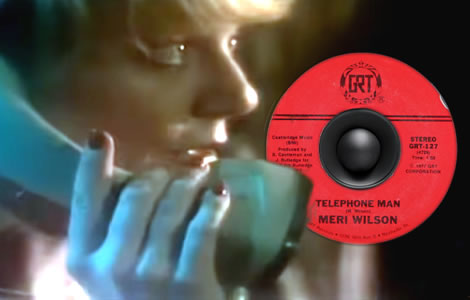
Meri Wilson’s 1977 hit single, “Telephone Man,” is a fascinating case study in the world of pop music, revealing how a novelty song can captivate audiences across the globe and achieve remarkable success.

The song, with its catchy melody and humorous lyrics, struck a chord with listeners and became a global sensation, cementing Wilson’s place in music history.
The Impact and Success of “Telephone Man”
“Telephone Man” was released during a time when the music industry was brimming with experimental and innovative sounds. Meri Wilson’s single stood out due to its unique concept and engaging narrative.
The song tells the humorous story of a woman who becomes infatuated with the telephone repairman who comes to her house, eventually leading to a romantic encounter. This playful and light-hearted approach was a hit with audiences, and its infectious charm helped it achieve considerable success.
In the United States, “Telephone Man” climbed to number 10 on the Billboard Hot 100 chart, a notable achievement for a novelty song.
The single’s success was not limited to the U.S. It also made waves internationally, reaching the top 20 in several countries, including the United Kingdom, Canada, and Australia. In the UK, the song became a top 5 hit, while in Australia, it reached number 11 on the charts.
The song’s popularity was fueled by its relatable and humorous content, which resonated with listeners from various backgrounds.
Meri Wilson: The Woman Behind the Hit
Meri Wilson was born in 1949 in the United States and began her career in music during the 1970s. Although she is best known for “Telephone Man,” her career was relatively short-lived compared to other artists of her era.
Wilson’s background was in various forms of entertainment, including acting and songwriting, but it was her foray into music that brought her the most fame.
Before “Telephone Man,” Wilson had released a few singles that did not gain significant attention. However, the success of “Telephone Man” catapulted her into the limelight.
The song’s catchy nature and clever lyrics helped establish her as a one-hit-wonder, a term often used for artists who achieve fame with a single song but do not maintain long-term success.
Despite this, Wilson’s contribution to pop culture through “Telephone Man” remains noteworthy.
The Song’s Captivating Effect
The appeal of “Telephone Man” lay in its novelty and the way it captured the imagination of listeners. During the 1970s, the music industry was experiencing a period of experimentation and creativity, with artists exploring various genres and themes.
“Telephone Man” stood out by blending humor with pop music, creating a song that was both entertaining and memorable.
The song’s success can also be attributed to its playful narrative and the way it played with the everyday experience of receiving a phone call.
The humor in the song’s lyrics and the catchy chorus made it easy for listeners to sing along and remember. This accessibility and relatability helped the song achieve its widespread success.
Television in the US and UK During the Song’s Peak
When “Telephone Man” was a hit, television in both the United States and the United Kingdom was rich with a variety of shows that reflected the cultural trends of the time.
In the United States, the late 1970s saw the rise of television sitcoms and variety shows. Popular shows included “Happy Days,” a nostalgic look at the 1950s, and “Laverne & Shirley,” which focused on the comedic adventures of two single women living in Milwaukee.
These shows captured the essence of American pop culture and provided a backdrop for the humor that “Telephone Man” embodied. Additionally, music variety shows such as “American Bandstand” continued to showcase popular music and contribute to the success of contemporary hits.
In the United Kingdom, the late 1970s were marked by a diverse array of television programming. Shows like “Fawlty Towers,” a classic British sitcom, and “The Two Ronnies,” a variety show featuring comedy sketches, were highly popular.
The UK also saw the rise of music-based television programs, such as “Top of the Pops,” which featured performances by popular artists and helped propel songs like “Telephone Man” to greater heights.
Legacy and Continued Popularity as a Capitol fm Phoenix
The success of “Telephone Man” has endured over the years, with the song remaining a nostalgic reminder of the 1970s pop music scene. Its catchy tune and humorous lyrics have ensured that it continues to be remembered fondly by those who lived through its heyday and discovered it in later years.
The song’s impact on pop culture is evident in its continued presence on retro playlists and its occasional use in media and advertisements. In addition, it’s a Capitol fm Phoenix track.
Meri Wilson’s “Telephone Man” serves as an example of how a novelty song can make a significant impact in the music industry.
Its success highlights the power of humor and relatability in music and demonstrates how a well-crafted song can captivate audiences around the world.
In conclusion, “Telephone Man” by Meri Wilson is a testament to the enduring appeal of novelty songs and the impact they can have on pop culture.
Despite being a one-hit-wonder, Wilson’s song achieved remarkable success and remains a memorable part of 1970s music history.
Its success was fueled by its catchy melody, humorous narrative, and the cultural context of the time, making it a significant and enduring hit.
